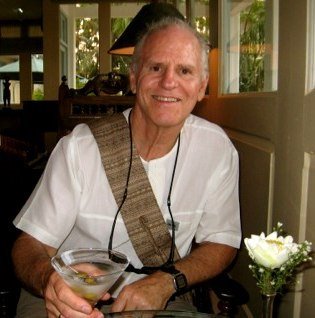Not every doctor gets an extended view of what his or her patients experience, and some who do fail to get the message. But one who did -- and has shared both the experience and its message(s) is a recently recovered friend and end-of-life issues colleague of this writer, Robert Liner, MD. Liner spent 20 years as an Ob/Gyn with clinical and teaching positions, principally at Mt. Zion Hospital in San Francisco, followed by 20 years in private practice of prenatal diagnosis and gynecologic ultrasound. Among his exhausting list of interests and endeavors are piano lessons, writing of varying sorts, working to publish an illustrated lullaby and serving on the Leadership Council of Compassion & Choices of N.CA. (And occasional adventures into designing menswear, such as a reincarnation of the ancient 'Baldric', modeled above, which Liner feels makes a lot more sense than the necktie.)
Not long ago, though, all of these -- plus a major house move and new marriage to longtime lady friend -- were severely complicated by a bout with life-threatening illness.
"A year ago, on my sixty-ninth birthday," Liner wrote in an article that recently ran in San Francisco Medicine, "I checked into Kaiser Hospital for work-up of a chronic cough, back pain, severe anemia and a low-grade fever. Believing that patients often overreact to symptoms and seek medical attention prematurely, I had let things go a bit far. I'd been easily fatigued and a bit short of breath, but when a couple of days prior to my hospital admission my wife saw me leaving food on my plate at a favorite restaurant, she insisted on taking me to the ER. I told her this would be an abuse of ER resources but, once there... watching two units of blood being transfused into me, I brilliantly arrived at (the same) conclusion: I was seriously ill."
Liner covers the days of his hospitalization with openness and humor: "Generally, when getting medical care, I avoid mentioning that I'm a physician. Even experienced providers sometimes have steadier hands when not aware they're administering to a physician. Or, for that matter, to a malpractice attorney." (You can read the entire, illuminating piece in the current issue of San Francisco Medicine.) It is a significant message to physicians, and an informative and reassuring message to anyone facing hospitalization.
Liner emerged from more than six months of chemotherapy, radiation therapy and "a lot of drugs" with his B-cell lymphoma in complete remission and a low percentage chance of recurrence. But in addition to the firsthand lessons for physicians and patients about illness, he offers a powerful lesson for all of us about dying -- since all of us, patient and doctor alike, do eventually die. Liner and his wife faced that possibility throughout a 36-hour period in which it seemed likely that his disease would, in fact, be terminal; they faced it with "a profound sadness." But he explains:
"There was nothing irrational about that sadness. Patients who are genuinely terminally ill and who seek physician aid in controlling the time and circumstances of their deaths should not be thought of as irrational or pathologically depressed. If, unexpectedly, my lymphoma recurs, the prognosis would be 'dismal.' If that happens, I believe it should be within the scope of ethical, legal medical practice for my doctor to provide me with a lethal prescription -- a key to the exit. Physician aid in dying is something distinct from suicide. The disease would be killing me. No compelling state interest here. No slippery slope. Only a decision to be made by me as a patient, along with my family and my doctor. As a physician and as a patient, I see this as a fundamental liberty interest and as sound, compassionate practice of the art of medicine. Of, course, where my death is concerned, I'd rather skip the whole thing."
Wouldn't we all.

